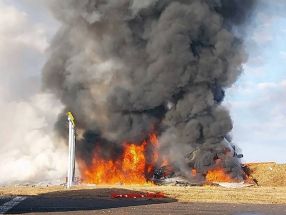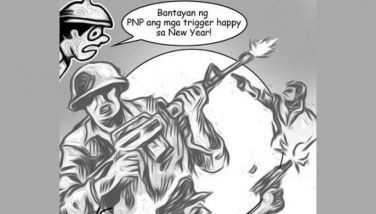US general paints grim picture of Russia relations
WASHINGTON — The top US commander for NATO painted Monday an increasingly grim picture of the West's deteriorating relationship with Russia, saying Moscow is effectively working to shift its border westward into Ukraine.
Gen. Philip Breedlove said Monday that Moscow's actions are forcing the West to beef up its military capabilities, and Russia is discussing plans to put aircraft in Ukraine's Crimea region that have a full range of capabilities, including possibly tactical nuclear weapons. He added, however, that so far he has seen no indications that Russia is deploying such weapons to Crimea.
"Hybrid war is what we are coming to call what Russia has done clearly in Crimea and in eastern Ukraine," Breedlove told a small group of Pentagon reporters, saying that Moscow has brought military, political and economic pressure on Ukraine, eroding the border and shifting it toward a line of demarcation further west. "I'm concerned that the conditions are there that could create a frozen conflict," one that creates a new reality.
Breedlove's comments come a day after contentious elections in eastern Ukraine Sunday where separatists voted for new leaders. The elections have been denounced as illegal by the US and EU, saying they undermined the two-month cease-fire agreement. That cease-fire, however, has been routinely violated, with fights between government and separatist forces raging daily in the Donetsk and Luhansk regions.
Breedlove, the supreme allied commander for NATO, said there are about 250 to 300 Russian troops in Ukraine training and equipping the Russian-backed separatists, and seven battalion task groups along the border. Some of those troops moved closer to the border as the election approached, and officials are now waiting to see if they fall back.
He added that Russian truck convoys are routinely crossing the border, including one that was poised to enter Ukraine Sunday. He said he's seen published reports that the convoy had crossed into Ukraine, but couldn't confirm them.
"We have seen a general trend towards a hardening of this line of demarcation and much more softening of the actual Ukraine-Russia border," said Breedlove, adding that the US and other NATO allies are readjusting their approaches to Russia, that recognize Moscow is no longer a partner.
At the same time, Russian has inflamed tensions with the West by conducting a number of recent military flights over the Black, Baltic and North Seas and the Atlantic Ocean that have become more provocative in recent days. Officials have said the warplanes have been flying in more complex formations and going deeper south.
"They're messaging us," said Breedlove, "that they are a great power and that they have the ability to exert these kinds of influences in our thinking."
Ukraine is not a NATO member, and so is not covered under its defense umbrella, but it has expressed interest in joining. Three other former Soviet republics have joined the alliance since the end of the Cold War, as well as the former Soviet satellite states of Poland, Hungary, the Czech Republic and Slovakia, Romania and Bulgaria.
The US and NATO are building a command and control, headquarters unit that will monitor and analyze events in the region and be able to react if alliance members are threatened. The unit, likely based in Poland and including several hundred troops, would be the core of a rapid reaction force.
Currently NATO allies are working out the details for how the unit would be staffed and equipped.
Breedlove also said that because of the unrest affecting NATO and European partners, he is opposed to any further reductions in the size of the US force in Europe. Current plans would pull a number of US aircraft and aviation troops out of the region.
He said he agrees with plans to reduce US military infrastructure in Europe, and those details are still being developed.
- Latest
- Trending





























